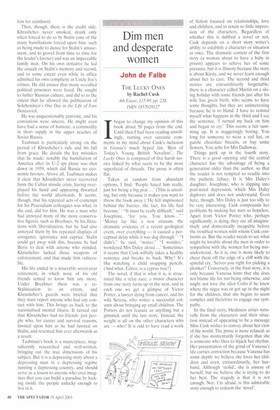Dim men and desperate women
John de Fa!be
THE LUCKY ONES by Rachel Cusk 4th Estate, £15.99, pp. 228, ISBN 1857029127 Ibegan to change my opinion of this book about 50 pages from the end. Until then I had been reading unwillingly, turning over sarcastic comments in my mind about Cusk's inclusion in Crania's much hyped list, 'Best of Today's Young British Novelists'. The Lucky Ones is composed of five harsh stories linked by what seem to be the most superficial of threads. The prose is often flat.
Taken at random from abundant options, I find: People hated him really, just for being a big prat ...' (This is arresting, but only because it makes you want to throw the book away.) He felt imprisoned behind the barrier, the fact, his life had become.— "It must be really difficult," said Josephine, "for you. You know..."' 'Money lay like a new stratum, the dramatic evidence of a recent geological event, over everything — it caused a perceptual delay while it was dug through.' "I didn't," he said, "notice." "I wonder," wondered Mrs Daley aloud ...' Sometimes it seems that Cusk wilfully takes a healthy sentence and breaks its back. Why? It's like watching a child snapping pencils. (And what, Editor, is a cyprus tree?)
The novel, if that is what it is, is structured like a relay race: a minor character from one story turns up in the next, and in each one we get a glimpse of Victor Porter, a lawyer dying from cancer, and his wife Serena, who writes a successful column about bringing up small children. The Porters do not feature as anything but a gimmick until the last story. Instead, the weight is all on the other characters who are — who? It is odd to have read a work of fiction focused on relationships, love and children, and to retain so little impression of the characters. Regardless of whether this is dubbed a novel or not, Cusk depends on a short story writer's ability to establish a character or situation at once. The dramatic context of the first story (a woman about to have a baby in prison) appears to relieve her of some pressure, but it is illusory because the story is about Kirsty, and we never learn enough about her to care. The second and third stories are extraordinarily forgettable: there is a character called Martin on a skiing holiday with some friends just after his wife has given birth, who seems to have some thoughts, but they are uninteresting because he is so bland. I have to remind myself what happens in the third and I see the sentence. 'I turned my back on him and began to cry.' This seems a fair summing up. It is staggeringly boring. You long for someone to wear a red hat, or guzzle chocolate biscuits, or buy some flowers. You ache for Mrs Dalloway.
Things perk up in the fourth story. There is a good opening and the central character has the advantage of being a generation older than the author, so that the reader is not tempted so readily into the pathetic fallacy. It is Mrs Daley's daughter, Josephine, who is slipping into post-natal depression, which Mrs Daley deplores and does not understand. Even here, though, Mrs Daley is just too silly to be very interesting. Cusk compounds her problems by making her men so hopeless. Apart from Victor Porter who, perhaps significantly, is dying, they are all imaginatively and domestically incapable before the troubled women with whom Cusk confronts us. But the reader needs to see what might be lovable about the men in order to sympathise with the women for being misunderstood. As it is, one is more likely to cheer them off the edge of a cliff with the spiteful cry, 'Serves you right for picking a plonked' Conversely, in the final story, it is only because Vanessa hints that she does not blame life for not being otherwise, and might not love the idiot Colin if he knew where the sugar was or got up in the night for the children, that she begins to seem complex and therefore to engage our sympathy.
In the final story, bleakness arises naturally from the characters and their situation instead of appearing to be a message Miss Cusk wishes to convey about her view of the world. The prose is more relaxed, as if she has momentarily forgotten that she is someone who likes to hijack her rhythm. Her presentation of the grind of Vanessa's life carries conviction because Vanessa has some depth: we believe she loves her children and even, extraordinarily, her husband. Although 'stolid', she is unsure of herself, but we believe she is trying to do her best. The tragedy is that it is not enough. Nor. I'm afraid, is this admirable story enough to redeem the 'novel'.


































































 Previous page
Previous page